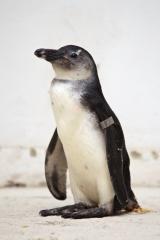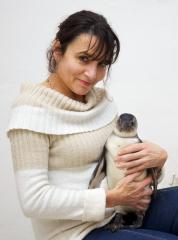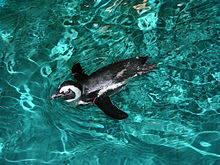Take a walk on the Wild side . . .
Penguin visits Hole in the Wall
 Inyoni (AKA Slipway)A crowd of bemused holiday makers gathered on the beach at Hole in the Wall yesterday where a small penguin had set ashore nursing an injured leg. As it is tagged (S29329), it definitely has had human contact before and seems to have landed at the busiest beach in the area specifically looking for help from humans. Especially as it is over 1000km away from its usual habitat.
Inyoni (AKA Slipway)A crowd of bemused holiday makers gathered on the beach at Hole in the Wall yesterday where a small penguin had set ashore nursing an injured leg. As it is tagged (S29329), it definitely has had human contact before and seems to have landed at the busiest beach in the area specifically looking for help from humans. Especially as it is over 1000km away from its usual habitat.
The African Penguin (Spheniscus demersus, Xhosa name: Nombombiya, and also known as the Black-footed Penguin) is an endangered species and there are fewer than 100,000 left in the world.
A hiker from nearby Coffee Bay turned out to be a marine biologist from Hawaii, and advised Charlene from Hole in the Wall Hotel on the correct care for the docile, cute little fuzzy, who whacked down 4 sards for dinner, and another 3 for breakfast this morning.
 Charlene & Inyoni"Inyoni", as Ian and Charlene named it, is being transported to the East London aquarium today.
Charlene & Inyoni"Inyoni", as Ian and Charlene named it, is being transported to the East London aquarium today.
"Threats
Of the 1.5-million African Penguin population estimated in 1910, only some 10% remained at the end of the 20th-century. African penguin populations, which breed in Namibia and South Africa, have declined by 95 percent since preindustrial times.
Commercial fisheries have forced these penguins to search for prey farther off shore, as well as making them eat less nutritious prey, since their preferred prey has become scarce. Global climate change is also affecting these penguin's prey abundance." (From http://en.wikipedia.org/wiki/African_penguin)
 African Penquin"The latest African Penguin census revealed that there are less than 100 000 adults left. Given the large decrease in the 20th century, there is considerable concern about the long-term viability of the African Penguin in the wild. Guano and egg collection caused a near collapse in the penguin population. More recently, reduced availability of pelagic fish, resulting from competition with commercial fisheries, has been responsible for the ongoing declines. the vulnerability of African Penguins is increased further by its concentration within relatively small geographic areas. Consequently, catastrophic events, in the form of oil spills affecting thousands of birds have now become one of the most immediate threats facing African Penguins. The one ray of hope in this otherwise dark cloud is that the African Penguin is a robust and tough animal and thus able to deal with the rehabilitation process far better than other species." (From: http://www.volunteers.bookingsouthafrica.com/listing-penguin-rescue-and-...)
African Penquin"The latest African Penguin census revealed that there are less than 100 000 adults left. Given the large decrease in the 20th century, there is considerable concern about the long-term viability of the African Penguin in the wild. Guano and egg collection caused a near collapse in the penguin population. More recently, reduced availability of pelagic fish, resulting from competition with commercial fisheries, has been responsible for the ongoing declines. the vulnerability of African Penguins is increased further by its concentration within relatively small geographic areas. Consequently, catastrophic events, in the form of oil spills affecting thousands of birds have now become one of the most immediate threats facing African Penguins. The one ray of hope in this otherwise dark cloud is that the African Penguin is a robust and tough animal and thus able to deal with the rehabilitation process far better than other species." (From: http://www.volunteers.bookingsouthafrica.com/listing-penguin-rescue-and-...)
Total views: 16,118 |

Comments
Jeff Brown
Mon, 11/07/2011 - 15:33
Permalink
Slipway the Penguin
Charlene (not verified)
Tue, 12/07/2011 - 14:57
Permalink
Update of Inyoni-
Marlene Els (not verified)
Sun, 17/07/2011 - 14:59
Permalink
Slipway
Add new comment